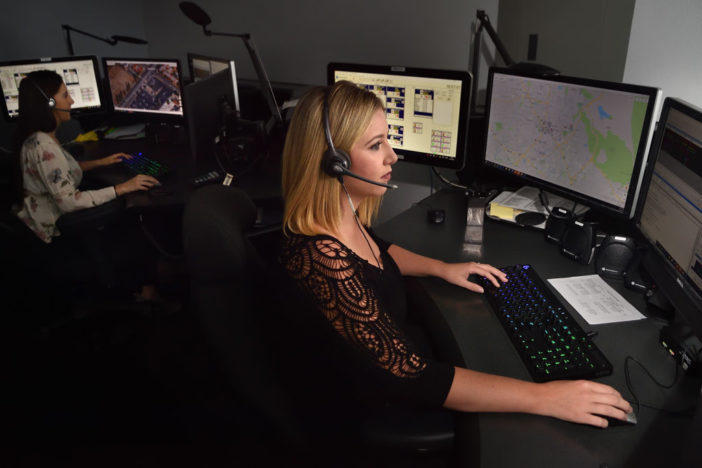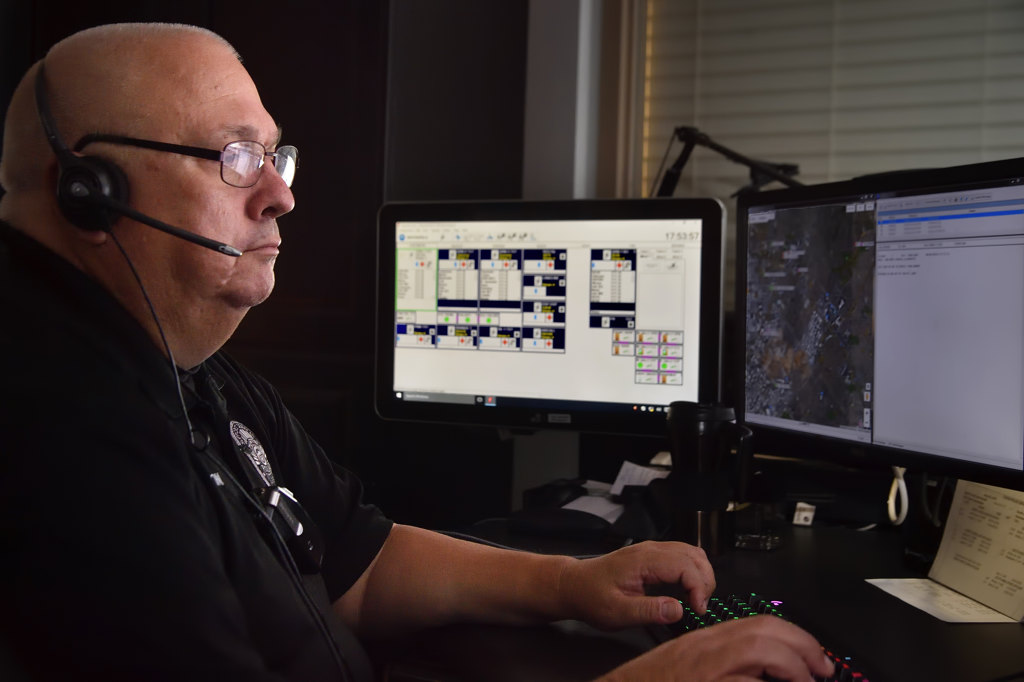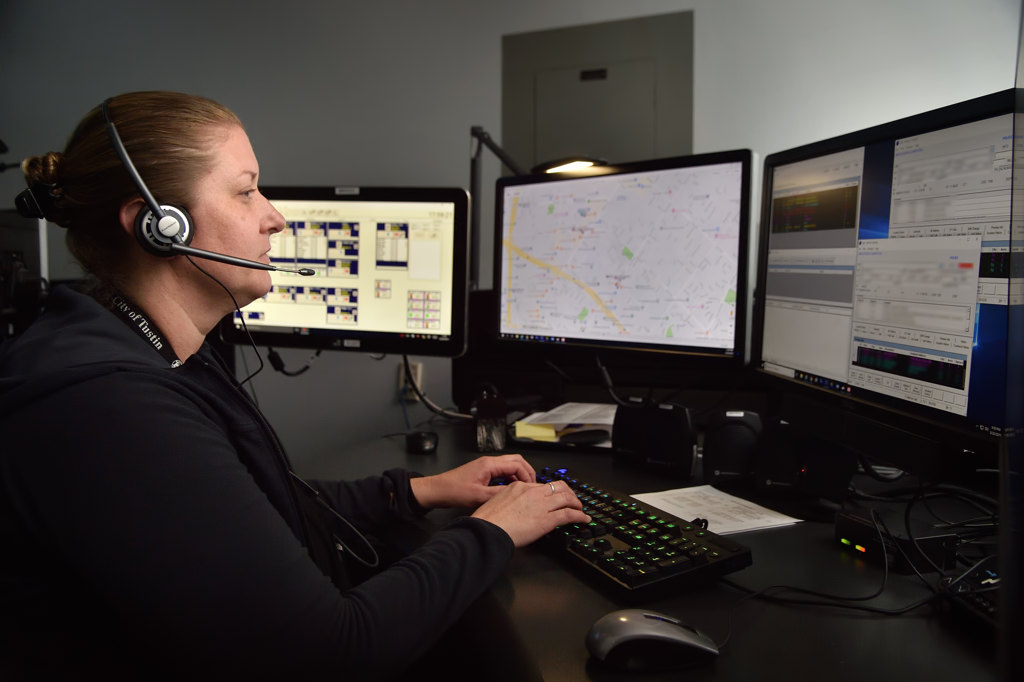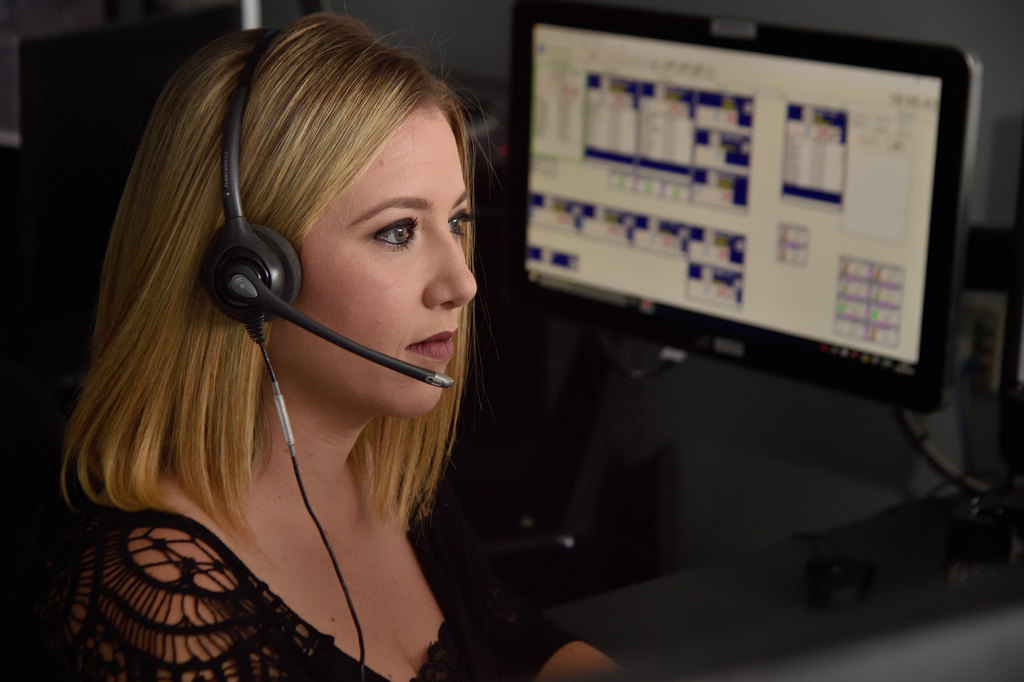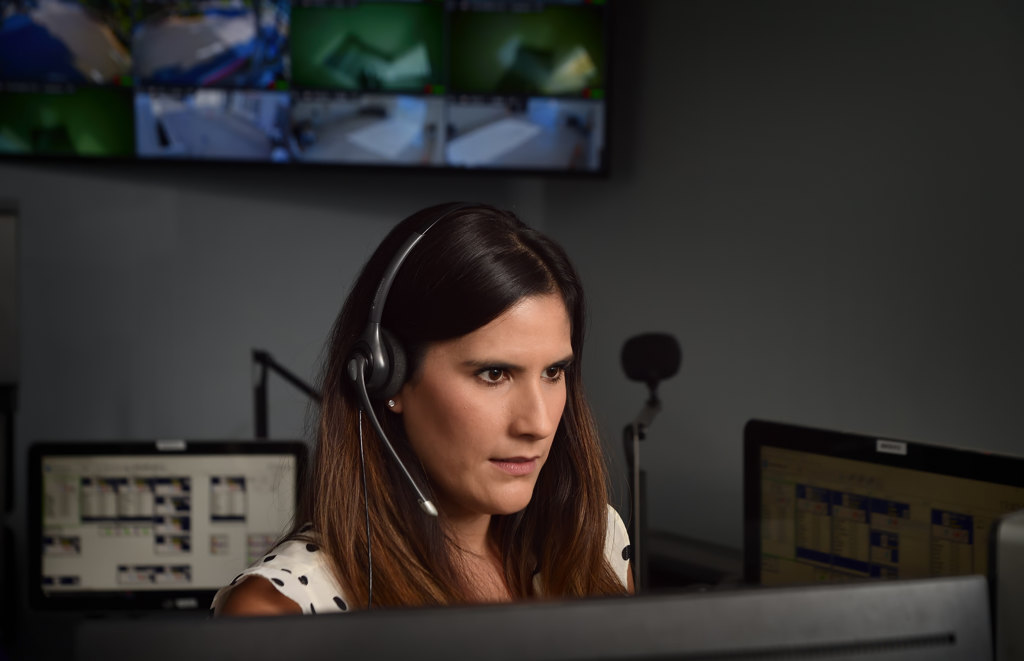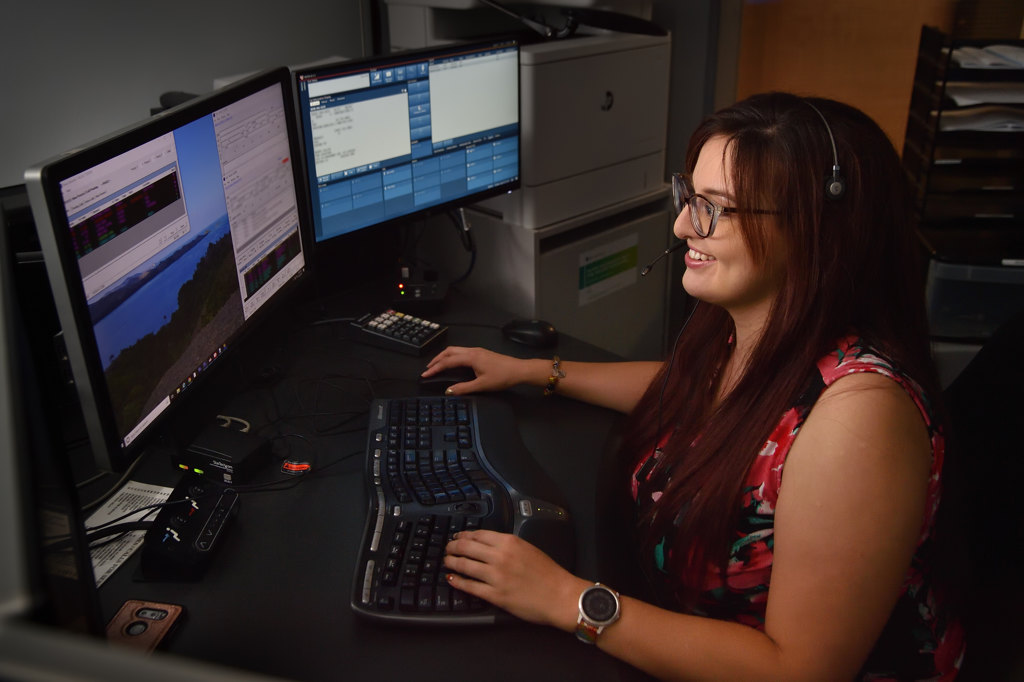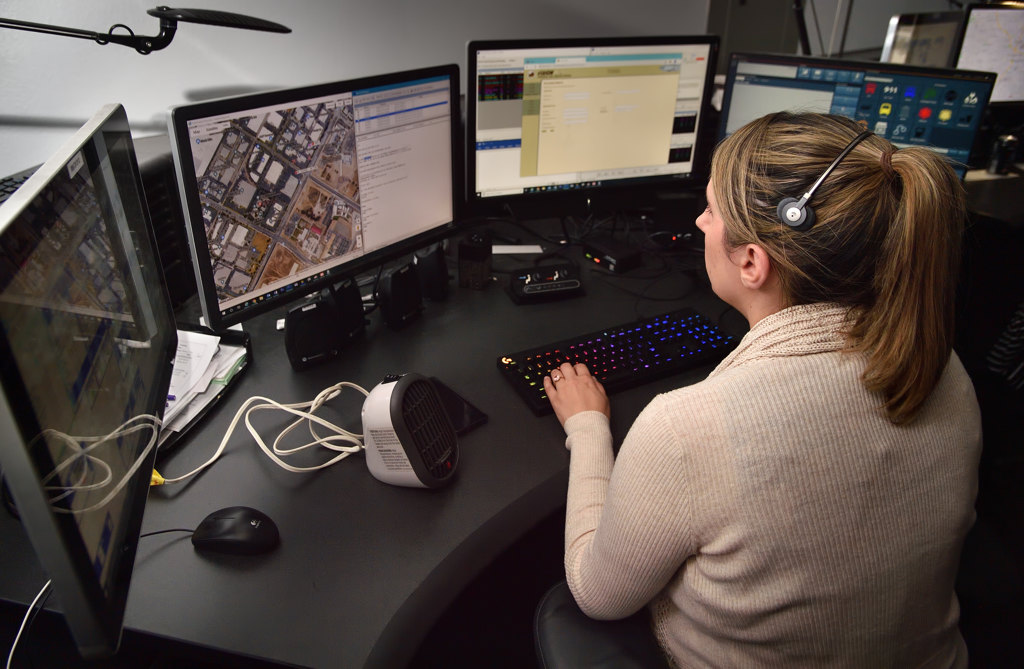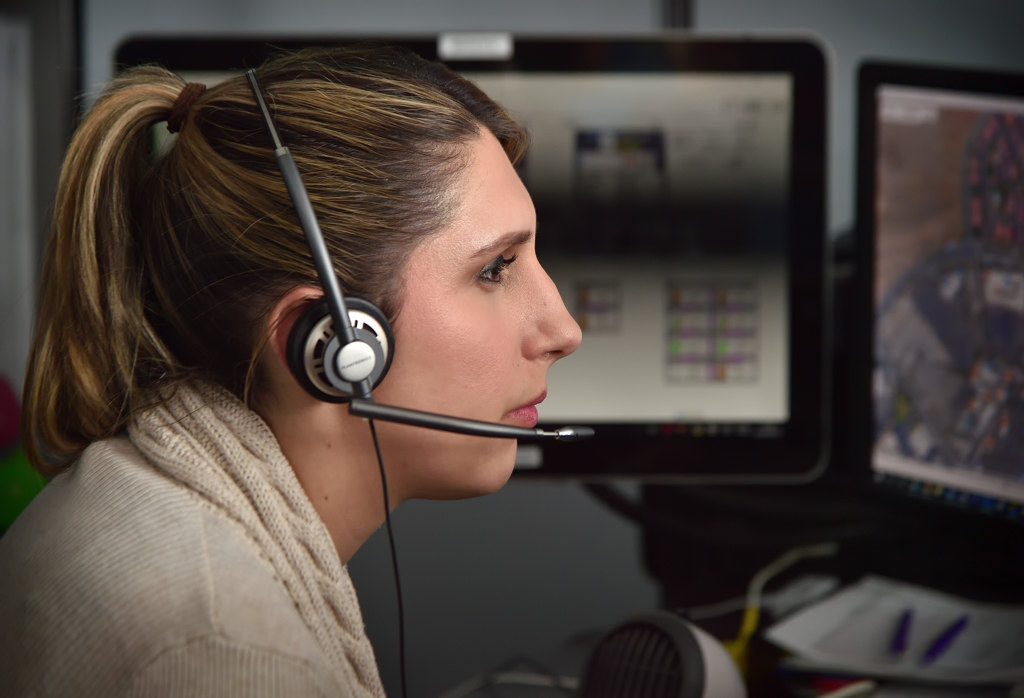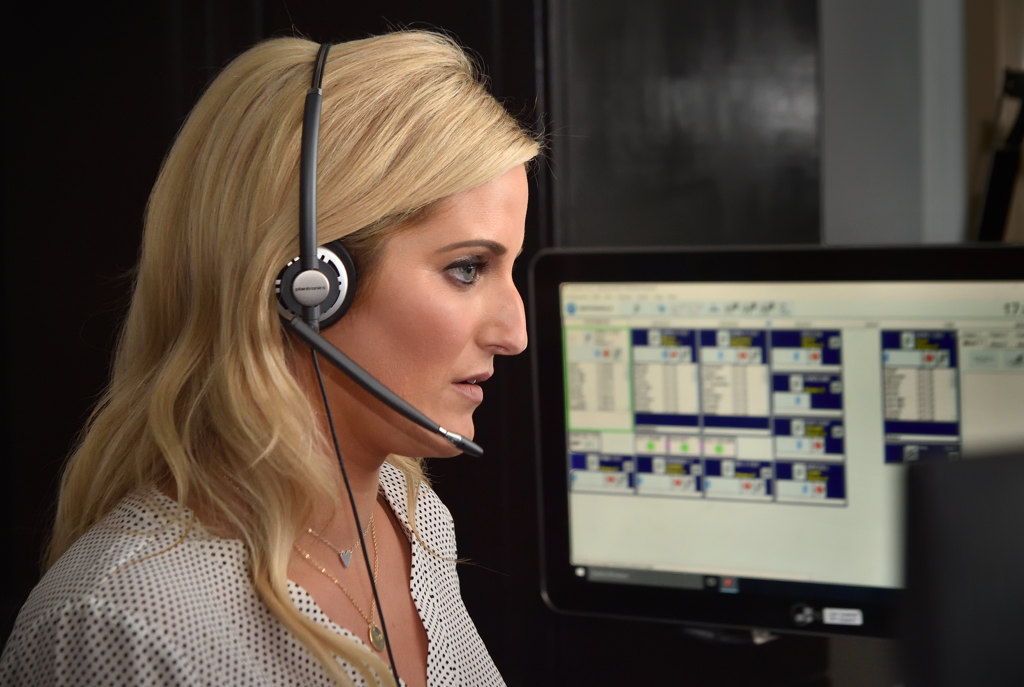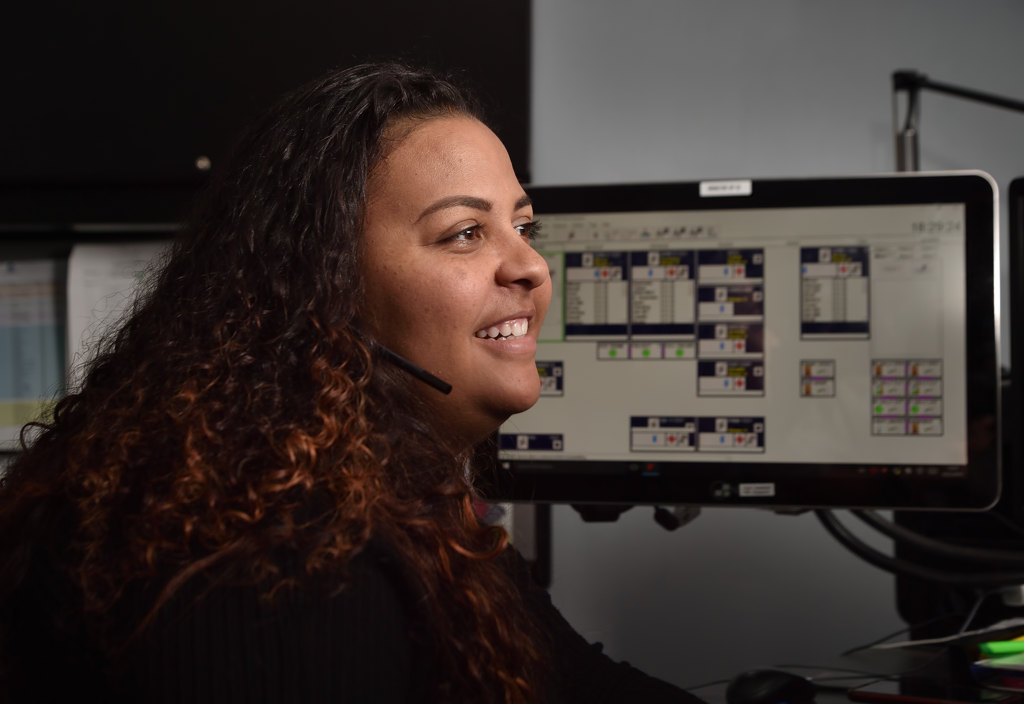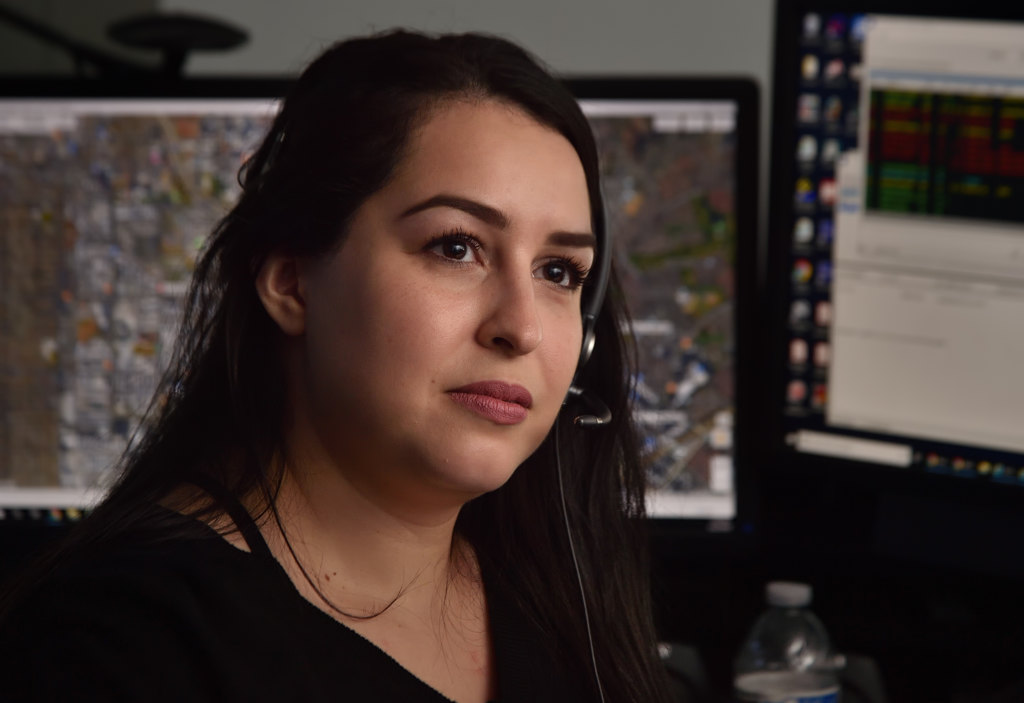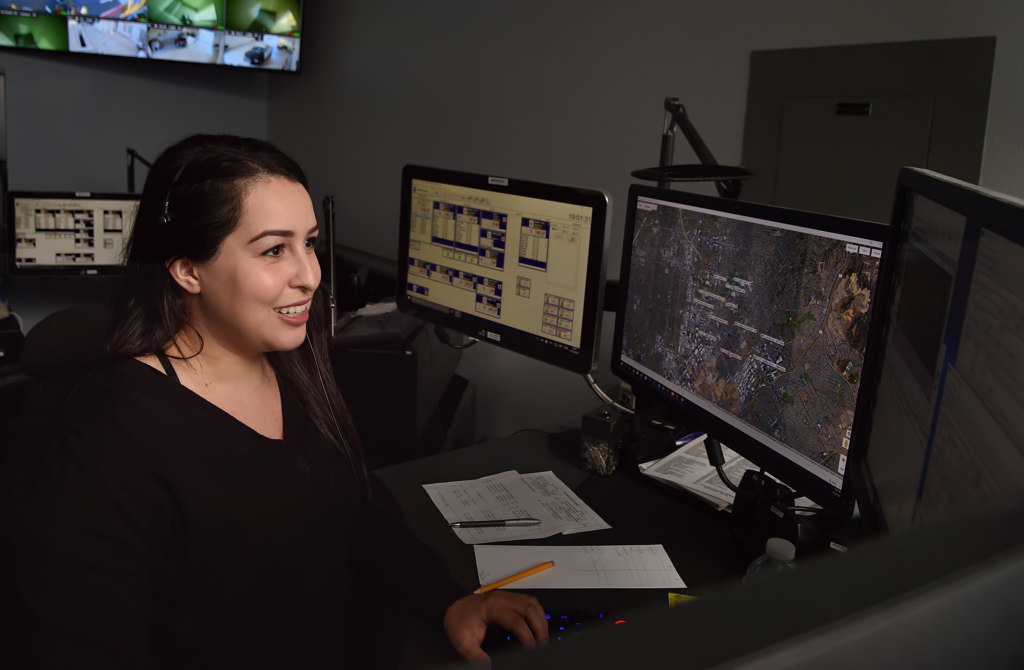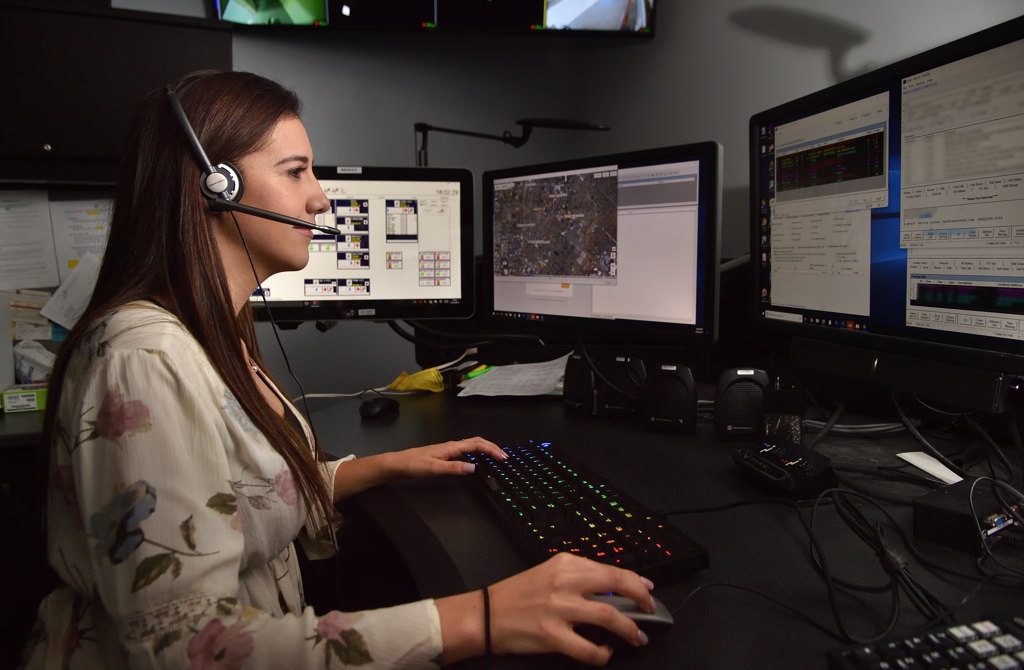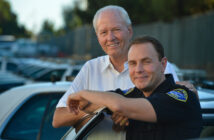Imagine a job where you’re expected to perform at 100-percent accuracy while confined to a small, dimly lit room with other Type-A perfectionists for 12½-hour straight – often on holidays or on your kid’s birthday, and in the dead of night.
Welcome to the world of dispatching at the Tustin PD.
The hard-working dispatchers who work in the TPD’s Communications Unit all agree that despite the at times very demanding and stressful aspects of their job – where multitasking can hit insane levels — they can’t imagine having any other career.
They cherish the rewards of helping people during the darkest moments of their lives, as well as doing their best to keep TPD patrol officers safe.
They enjoy the family-like vibe of working closely together, and some of the quirky calls they get, like the time when a woman called 911 because a Chinese restaurant got her entrée wrong. The woman called the TPD to complain that the restaurant refused to give her a refund for her kung pao beef, half of which she had eaten.
Children and adults, a friendly reminder: Only call 911 for true emergencies!
“It can be a pressure cooker,” says Kristin Fetterling, a longtime dispatcher who was promoted just over two years ago to Communications Supervisor and now runs the unit, managing 10 full-time dispatchers and three part-time dispatchers.
“It can go from a relaxed evening to the worst night of somebody’s life,” Fetterling said. “And while the officers get to use all of their senses – they’re seeing the call, they’re hearing it, they’re moving through it – we’re just hearing it and being that calm voice despite whatever’s going on in the (dispatch) room.”
On a recent weeknight, two TPD dispatchers (there are always a minimum of two on duty), Natalie Jimenez and Kelsey Peterson, were working the agency’s four incoming 911 lines, two text-to-911 lines, and seven administrative lines, which are for non-emergency calls and police radio and running all the subjects the officers contact.
A third dispatcher, Kacia Gist, was preparing to go on a ride-along with members of the agency’s GRADE (Gang Reduction and Directed Enforcement) unit. TPD dispatchers commonly go on ride-alongs to get a real feel for the job of the patrol officers and better understand the geography of the City.
“Tustin Police Dispatch,” Peterson said into her headset.
A caller was reporting an abandoned vehicle.
“Which parking lot?” Peterson asked.
“What’s the color make and model on that?”
Peterson, a TPD dispatcher for a little over two years, continued to ask questions as she clacked away on her keyboard.
“Do you have a license plate?”
“And it’s been there for a week? OK. And what’s your callback number?
“We’ll get somebody out there to check on it. Nobody’s in the car, correct?
“OK, we’ll get somebody out there. You’re welcome.”
Dave Kanoti, a former longtime TPD dispatcher and 31-year agency veteran who now is field support division manager, praised the work of the Communications Unit and Fetterling’s leadership.
“She does a phenomenal job in keeping not only the citizens of Tustin safe, but keeping a rather difficult atmosphere, a difficult position to be in, positive and productive,” Kanoti said.
“It’s her knowledge, her personality, and her ability to motivate others to get along in a tough environment,” he added. “It takes real talent to be able to keep things moving along so well, because there are times in there when it’s challenging and frustrating, and for her to be able to recognize it and be ahead of it, that says a lot about her skills as a manager.”
Officer Javon Smith, of the GRADE unit, popped into the dispatch room to take Gist on the ride-along.
“They keep a really good eye on us,” Smith said. “It’s really easy for an officer to get disoriented when focusing on trying to find a bad guy. You jump a couple of walls and wonder, ‘Where am I now?’ The dispatchers we work with are always looking after us and do a good job of thinking ahead.”
Reporting to her graveyard shift, Natalie Jimenez brought in some bratwurst for her and her partners and a book, “The Education of a Coroner,” by John Bateson, for the inevitable down time, typically between 2 a.m. and 6 a.m.
The dispatch room includes a fully stocked refrigerator, microwave, cooktop, Instapot, two coffee makers, and a treadmill. Once in the room, dispatchers do not leave except for bathroom breaks.
“I like the type of work because it’s never the same,” said Jimenez, who started at TPD as a cadet. “And I like that we have such a big responsibility, which is taking care of our officers. We love each other like brothers and sisters. Sometimes I’ll get mad at someone, but it’s all about having their backs and really being a part of a team.”
Gist says Fetterling is a great boss.
“I think she’s amazing because she’s actually a supervisor who will jump in and assist us when we need help when it gets super busy in here,” Gist says. “And she’s always friendly — even when things get a little difficult sometimes.”
Calls for service have been steadily increasing in Tustin in recent years, Fetterling says.
Last year, TPD dispatchers answered 97,727 calls. Of those calls, 21,722 were 911 calls.
Although the state mandates that police dispatchers answer 90 percent of all incoming 911 calls within 15 seconds, the TPD routinely crushes that standard.
“Last year,” Fetterling says, “We answered 98 percent of our 911 calls within 10 seconds. Our dispatchers are amazing. It’s honestly the level of service that we expect from them.”
Meet TPD’s Communications team:
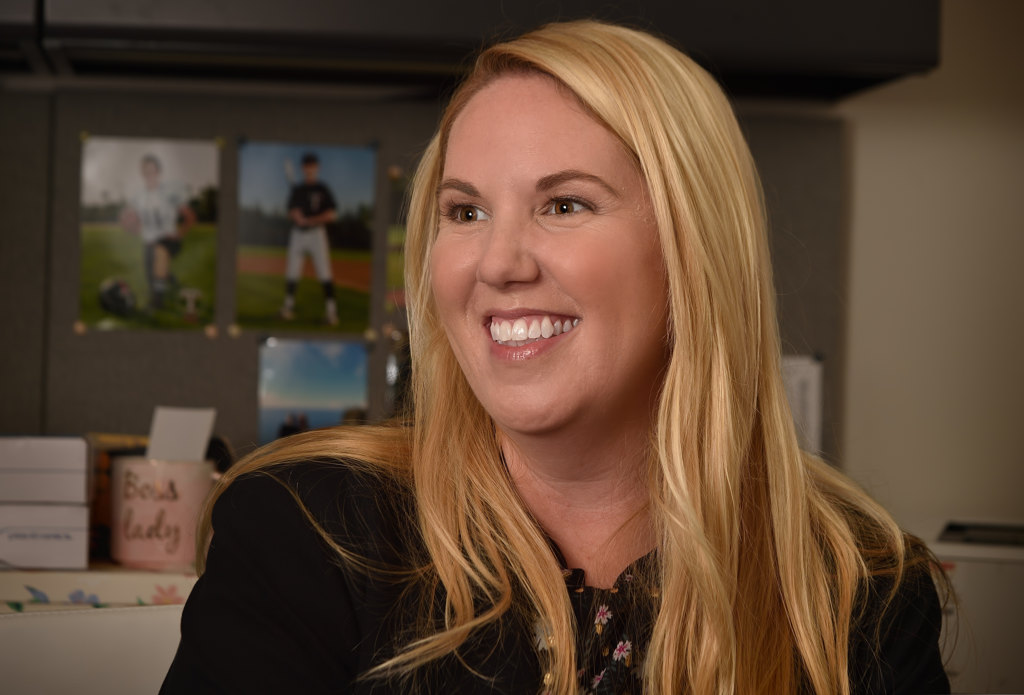
Tustin PD Communications Supervisor Kristin Fetterling talks about the professionalism of her dispatchers.
Photo by Steven Georges/Behind the Badge
Kristin Fetterling
Communications Supervisor
Years on unit: 11
“I work with some of the most exceptional individuals. As a profession, we expect perfection; there isn’t room for error when lives are on the line. In the most perilous moments, dispatchers remain calm and ensure help is on the way, for both our officers in the field and the callers on phone.”
“They are the calm voice with you during your worst moments. We mourn with a family who loses a child, and feel vulnerable with an innocent shooting victim who has just seen the worst of humanity.”
“Dispatchers do this all internally, later, after help is sent and they go home for the day. It takes a special kind of person to do this job. It’s those moments that define who we are and why we come back each day.
Eric Nelson
Lead Dispatcher
Years on unit: 20
“I am lucky to work in the city where I grew up. I chose a career dedicated to giving back to that community. I rest easy knowing I can be there for someone in their time of need and make a difference. My reward is working with the most exceptional group of men and women and learning something new every day.”
Amanda Shanahan
Full-time dispatcher
Years on unit: 13.5
“I never thought that I would fall into the family business, but I am so glad that I did. I get to work in an environment that is like a second family. Each day brings a new task to handle and I never stop learning. I am proud to be a part of a well-oiled machine that helps keep not only the citizens safe, but our officers as well.”
Chelsea Jensen
Full-time dispatcher
Years on unit: 11
“The best part about this job is that no two days are the same. One minute everything can be slow and calm and in a second everything can change to chaos. When you’re in the middle of that chaos it’s such an adrenaline rush.”
“By the end of that call, you look back and wonder how in the world you managed to take care of everything that needed to be done. Most people don’t realize that there are usually only two of us working at a time in the dispatch center, which means that two people are doing a job that is easily enough work for five people, sometimes more.”
“It’s so satisfying knowing that all of your officers went home safe at the end of the day and that you could be partially responsible for saving someone’s life.”
Danielle Guardado
Full-time dispatcher
Years on unit: 8
“Being a dispatcher is no easy task. It’s challenging, fast-paced, and stressful, but also extremely rewarding. The feeling of knowing you have made a difference and helped someone far outweighs the long hours, intense calls, and stressful times.”
Kayleen Kuykendall
Lead dispatcher
Years on unit: 7
“I’m grateful to have an exciting career with a group of fun partners who I love like family.”
Kailey Kaczor
Full-time dispatcher
Years on unit: 6
“There is no job quite like being a police dispatcher, but despite the chaos, there’s a feeling of satisfaction that comes with being able to help the community. I whole-heartedly believe I work with some of the best dispatchers in the business.”
“A great dispatcher has good instincts and I am so proud to work with a group of intuitive dispatchers and police officers. It’s a wonderful feeling to come to work and feel like I am with my second family. I wouldn’t give the job up for anything.”
Kelsey Petersen
Full-time dispatcher
Years on unit: 2½
“I became a police dispatcher to help people in the community. I like that at the end of my shift, I know that I have helped someone on what could be the worst day of their life, and all my officers went home safe.”
Kacia Gist
Full-time dispatcher
Years on unit: 3
“I love coming to work every day because you never get the same call twice. Each time you pick up the phone you get to help someone new while they’re experiencing one of the worst times in their life.”
Natalie Jimenez
Dispatcher
Years on unit: 2
“Ten years ago, I told myself I would never be a dispatcher because I didn’t believe I had what it took. Fast forward to now and here I am, with a permanent dent in my hair from my headset. It took time to get here, but I made it.
“I knew this position would be different from all the other areas in the Department. I worked as a cadet, but I could never have guessed how much this career changes you. You begin to see the world through a different lens, but that same lens acts as a prism which allows you to see a different side of yourself. It shows you a side that you thought you didn’t have, which is the reason why it took me so long to join the dispatch team.”
“Being here has allowed me to discover facets about myself I had never seen. I’ve truly found myself through my work while simultaneously doing something for my community and that, to me, is success.”
Carly Watson
Full-time dispatcher
Years on unit: One
“I’m thankful for all my co-workers who challenge me every day to become the best dispatcher I can be. I would not be where I am without them and I am truly grateful to be a part of this team.”
Piper Keo
Part-time dispatcher
Years on unit: 30
“As my career winds down at Tustin PD, I still believe this is the best job ever. No two days are ever alike and you cannot be bored. Dispatching can definitely be hard and stressful, but is also challenging and rewarding when you do your job well.”
Dina Warner
Part-time dispatcher
Years on unit: 11
“The challenges and expectations of police dispatching change constantly. It is important to never become complacent and think that a shift will be slow or nothing will or can happen. We always have to be aware of ‘the worst that can happen’ so that we don’t become complacent on a shift.”
“We must continually be proactive in terms of officer safety and the safety of the citizens we protect. This means we have to be detailed in our calls, asking the right questions, and providing officers with pertinent information. We must be ready for anything at any time. Keeping up to date with training for each possible situation is paramount to keeping up with the changes in our community.”
“There is no other job I would ever want to do more than police dispatching; it is part of who I am.”
Debbie Ernandez
Part-time dispatcher
Years on unit: 16
“Becoming a dispatcher was not something that was easy for me. In fact, the intense training process to learn the skills needed to become proficient at it was the most difficult challenge of my life at that point. When I got married and we started a family, I found myself torn because although I was needed at home with a husband who also worked long and odd shifts, dispatching was much more to me than just showing up to work for a paycheck. It was a calling and something I thoroughly found rewarding. We become a family here.”
“I’m grateful I was given the opportunity to experience the best of both worlds. I get to raise and homeschool my four kids and still dispatch part-time. I truly enjoy each time I come in to work, knowing I’m helping our officers and the citizens of Tustin, and just being around some amazing people.”
“Each of us as dispatchers carry calls or radio traffic of certain incidents with us and sometimes replay them in our mind: the adrenaline, the cries, the screams, the fear in the hushed little voice of a child begging for us to send help. We choose to continue because we care.”
“We can’t separate the human element from what we hear and virtually walk through with other people often at their very worst moment in life. It’s heavy at times but it’s also a privilege. Reflecting with some healthy emotion is a good indication that compassion is still alive and well. We have a great peer support program and I know that after every especially difficult incident someone has reached out to ensure we as dispatchers are OK and we are included in the debrief process along with the handling officers.
“I’m proud of our team of dispatchers and the level of service we provide the citizens of Tustin. We are trained, capable, prepared and confident to handle whatever any given shift may throw at us.”
 Behind the Badge
Behind the Badge
